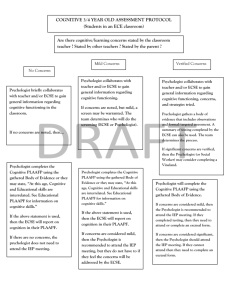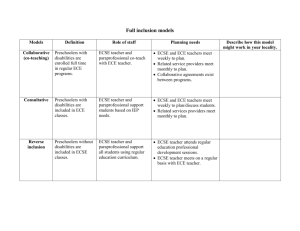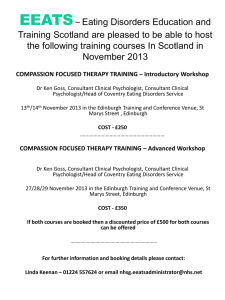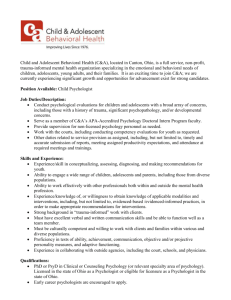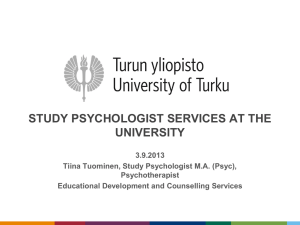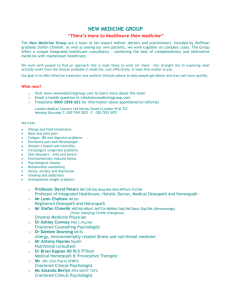5 Year Old ECE Cognitive Evaluation Flow Chart
advertisement
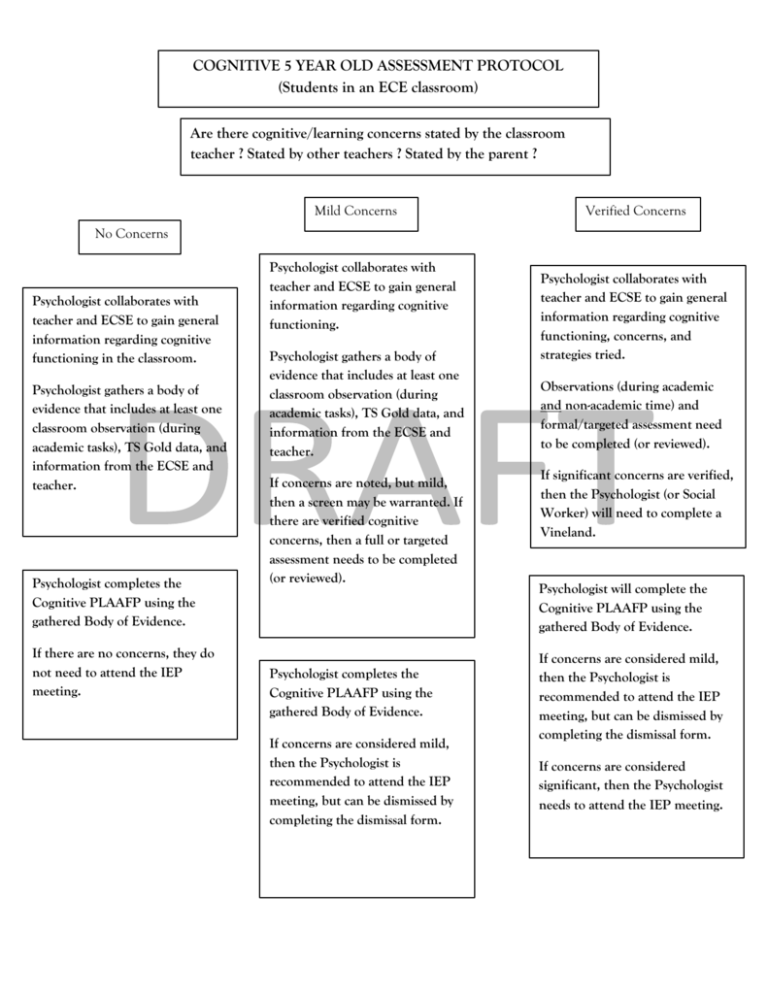
COGNITIVE 5 YEAR OLD ASSESSMENT PROTOCOL (Students in an ECE classroom) Are there cognitive/learning concerns stated by the classroom teacher ? Stated by other teachers ? Stated by the parent ? Mild Concerns Verified Concerns No Concerns Psychologist collaborates with teacher and ECSE to gain general information regarding cognitive functioning in the classroom. Psychologist gathers a body of evidence that includes at least one classroom observation (during academic tasks), TS Gold data, and information from the ECSE and teacher. Psychologist completes the Cognitive PLAAFP using the gathered Body of Evidence. If there are no concerns, they do not need to attend the IEP meeting. Psychologist collaborates with teacher and ECSE to gain general information regarding cognitive functioning. Psychologist gathers a body of evidence that includes at least one classroom observation (during academic tasks), TS Gold data, and information from the ECSE and teacher. If concerns are noted, but mild, then a screen may be warranted. If there are verified cognitive concerns, then a full or targeted assessment needs to be completed (or reviewed). Psychologist completes the Cognitive PLAAFP using the gathered Body of Evidence. If concerns are considered mild, then the Psychologist is recommended to attend the IEP meeting, but can be dismissed by completing the dismissal form. Psychologist collaborates with teacher and ECSE to gain general information regarding cognitive functioning, concerns, and strategies tried. Observations (during academic and non-academic time) and formal/targeted assessment need to be completed (or reviewed). If significant concerns are verified, then the Psychologist (or Social Worker) will need to complete a Vineland. Psychologist will complete the Cognitive PLAAFP using the gathered Body of Evidence. If concerns are considered mild, then the Psychologist is recommended to attend the IEP meeting, but can be dismissed by completing the dismissal form. If concerns are considered significant, then the Psychologist needs to attend the IEP meeting. Process for the Assessment of Cognitive for 5 year olds in an ECE classroom 1. ECSE (Early Childhood Special Educator) is the case manager. She will contact the Special Education Team (Nurse, SLP, Psychologist, Social Worker, and OT/PT if needed) to alert them that an ECE student has been referred for an initial. 2. Psychologist will talk with ECSE, ECE teacher, and other providers to gather information about specific concerns. A meeting is recommended with all involved with the IEP process to discuss areas of concern and what evaluations will be completed and by whom. 3. The Psychologist will be evaluating Cognition. 4. The ECSE will make any pertinent information available Psychologist to review. 5. The Psychologist will gather their Body of Evidence. This includes: • review data that is available from ECSE, ECE teacher, and other providers; • conduct at least one observation during an academic period; • complete a screen or assessment (targeted) if cognitive concerns are present. The psychologist may also report on any testing completed by the ECSE. 6. Based on the Body of Evidence: If there are no concerns, the Psychologist will complete their PLAAFP. They do not have to attend the IEP meeting. If mild concerns are noted, then the Psychologist will decide if they need to get more specific information via interviewing the parent, observing the assessment by the ECSE, collecting data, and/or completing specific screening/assessment measures. If the ECSE is also doing an assessment (i.e., Mullen) then the Psychologist may review that information and make their own interpretation of this data as part of their Body of Evidence. The Psychologist completes their PLAAFP based on all the information collected. If concerns are mild, it is recommended that the Psychologist attend the IEP meeting. If that is not possible (due to scheduling conflicts), they need to complete an excusal form. If there are verified concerns, the Psychologist will complete a full formal assessment. If the student is looking like they might be considered for an MI or Center Program, then the Social Worker or School Psychologist will also need to complete a Vineland. The psychologist is required to attend the IEP meeting. In certain circumstances (and depending on age of child), a review of a Cognitive assessment done by others (i.e., privately, Children’s Hospital or by the ECSE) may satisfy the need to do a full assessment. This will be determined on an individual basis. The review of data from others is considered part of the Body of Evidence and must be summarized by the Psychologists (in their own words) on the Cognitive PLAAFP. 7. If the parent speaks a language other than English, School Psychologist may use someone in the building to help them communicate with the family. An interpreter will be arranged by the ECSE for the evaluation and IEP meeting. 8. If you have any questions, you may ask the ECSE in your building, or you may email Sheri_Katzman@dpsk12.org , Erin Turner or Melanie Wheeler. MEASURES TO SCREEN/ASSESS COGNITION OF 5 YEAR OLDS. (If assessing for SLIC or Center Placement, then a full assessment needs to be completed.) 1. Mullen Scales of Early Learning – may use with 3 and 4 year olds or low functioning 5 year olds. 2. Differential Abilities Scale-2 – use to determine SLIC or as targeted assessment (can administered specific subtests) 3. WPPSI-3 – use to determine SLIC or as targeted assessment (can administered specific subtests) 4. K-ABC-2 5. BRIGANCE Screen – a developmental inventory of basic skills needed for children to succeed in school. 6. DIAL-4 – Can use to screen pre-academic and cognitive skills. 7. TBPA-2 (only if the child’s skills are too low to complete a standardized measure or behavior is so significant that standardized measures are inappropriate. More appropriate for younger children, i.e. 3 year olds or young 4s who have not been in school. Not appropriate for 5 year olds.) *This is not an exhaustive list of measures, but some ideas of those that are available.



